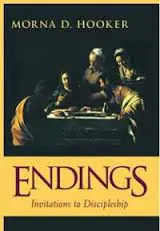

Endings: Invitations to Discipleship
Pages
104
Publisher
Hendrickson
Published
2003
ISBN-13
9781565633568
In literary works, endings are critical; an author’s conclusion to a story or an argument is intended to shape our understanding of the whole.
In this engaging and deceptively simple study, a companion volume to her much-praised Beginnings, Morna D. Hooker explores the final pages of each of the four Gospels and the book of Acts, and attempts to uncover the specific messages that the Evangelists hoped to convey to their readers.
Nearly all of the Old Testament books have forward-looking conclusions. What, then, is the significance of the way in which these New Testament documents end?
Reviews
This brief work by Morna Hooker originated as a lecture presented at Cambridge upon her retirement and a series of lectures at the Chinese University of Hong Kong in 2001. As such it has the flavor of a verbal presentation rather than a scholarly manuscript. To her credit, Hooker does provide a reasonable number of notations as endnotes, a decision that assists in maintaining the oral flavor of the original. The focus of this manuscript is upon the various techniques employed by the Gospel writers to bring their accounts to an end, not necessarily a close. As the back-cover description indicates, this is a �deceptively simple study,� one that will provide the reader with many avenues for further exploration. The book consists of six short chapters: an introduction, the four Gospels, and an epilogue. The introduction, �Beginnings and En dings,� indicates the connection between this and her earlier work, Beginnings: Keys That Open the Gospels (Trinity Press International, 1998). Hooker briefly discusses the general way that stories begin but focuses on the relationship between the beginnings and endings of stories. Her concerns as she approaches the Gospels is entirely literary. In a very specific statement, one of few where she specifically enters the scholastic fray, Hooker is not persuaded that the Gospels are biographies, contra the work of R. A. Burridge, What Are the Gospels? (1992). Her rationale is consistent with the rest of her book: �the Gospels do not end like biographies� (5).
[Full Review]
It took two readings fully to appreciate the skill and depth of this small book. The style makes for easy reading with helpful analogies drawn from everyday life; the language is nontechnical, and notes appear at the end of the book. First appearances are certainly deceptive. As a companion to her earlier work (Beginnings: Keys That Open the Gospel [London: SCM, 1997]), Hooker sets herself a far more difficult task, to write succinctly on the final chapter of each Gospel without retelling the entire Gospel. She succeeds in this task with great insight. She begins with a chapter on the narrative significance of endings, showing how different the Gospels are to ancient biographies, since the Gospels have an apologetic purpose. The Gospel endings therefore remain open-ended, or suspended, challenging the reader to seek for more. In this open-ended style the Gospels repeat the style of most Old Testament works. After this brief introductory chapter, Hooker analyzes each Gospel in biblical sequence. In each case she shows both the unfinished nature of the �ending� and its relationship to the Gospel narrative (especially the opening chapters), then proposes a theological purpose that such an open-ended conclusion may serve. Mark�s original endi ng concludes with fear, failure, and disobedience, which are the qualities already observed in the disciples across the narrative.
[Full Review]
